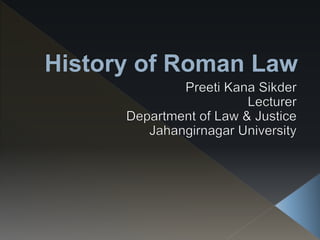
Background of Roman Legal Principles: Roman history
- 2. Region of central western Italy in which the city of Rome was found and grew to be the capital city of Roman Empire. Located on the left bank of the River Tiber, it was a small triangle of fertile, volcanic soil on which resided the tribe of the Latins. (Source: Wikipedia)
- 4. The Imperial Period 31 BC 565 AD The Republican Period 510 BC 31 BC The Regal Period (Ruled by the Kings) 753 BC 510 BC
- 6. The social unit was the patriarchal family, in which the highest living ascendant was the sole proprietor and at the same time the judge and priest. Kinship was reckoned exclusively through males. The family consisted of a group subject to the power of a living male ascendant (paterfamilias) The agnates comprised of these and all other known to be descended through males from a common ancestor no longer living.
- 7. Outside these was the gens or clan, whose members had a common name and a common worship. They supposed themselves related to one another by descent from a common ancestor, though the relationship was imaginary or too remote to be traced
- 9. Most ancient legislative assembly (Assembly of the People) An inner body of this comitia would form the Senate. Method of Voting: each curiae had one vote, and the measure was carried out or lost according to the rule whether the majority of the curies voted for or against it.
- 10. Functions: › Rarely passed laws of general application › Usually authorized departures from settled custom › Had no right of discussion or amendment › No change affecting public or private law could be made without its consent
- 11. Administrative and deliberative council of nobles Experience and social influence of its distinguished members made it difficult for the King to neglect their advice. In important affairs the King did not determine course of action without consulting with the senate.
- 12. Election of a King Examine laws passed in the public assembly Giving Counsel to the King
- 13. Head and Ruler of the Roman Community He had the power of life and death over citizens. To him belonged the command of the Army, the administration of justice and the general superintendence of religion The King was elected for life by the comitia upon the proposition of a senator.
- 14. The laws of early kings were customs consisting mainly of religious rules. These laws were first rudiments of jurisprudence When legislation was resorted to, it was generally to confirm, add to or modify, rather than to supersede, these primitive usages
- 15. Leges Regiae • Law Prepared by the King Approbation • Senate Confirmation • Comitia Curiata
- 16. First class: 20 acres of land Second class: 15 acres of land Third class: 10 acres of land Fourth class: 5 acres of land Fifth class: 2 acres of land
- 17. First class: 20 acres of land : 80 centuries of soldiers Second class: 15 acres of land: 20 centuries of soldiers Third class: 10 acres of land: 20 centuries of soldiers Fourth class: 5 acres of land: 20 centuries of soldiers Fifth class: 2 acres of land: 30 centuries of soldiers 18 centuries of cavalry made up of richest patricians and 5 centuries of musicians, working men and complementary men
Editor's Notes
- Agnate: A relative whose relation is traced only through male members of the family Cognate: A relative from the mothers’ side
